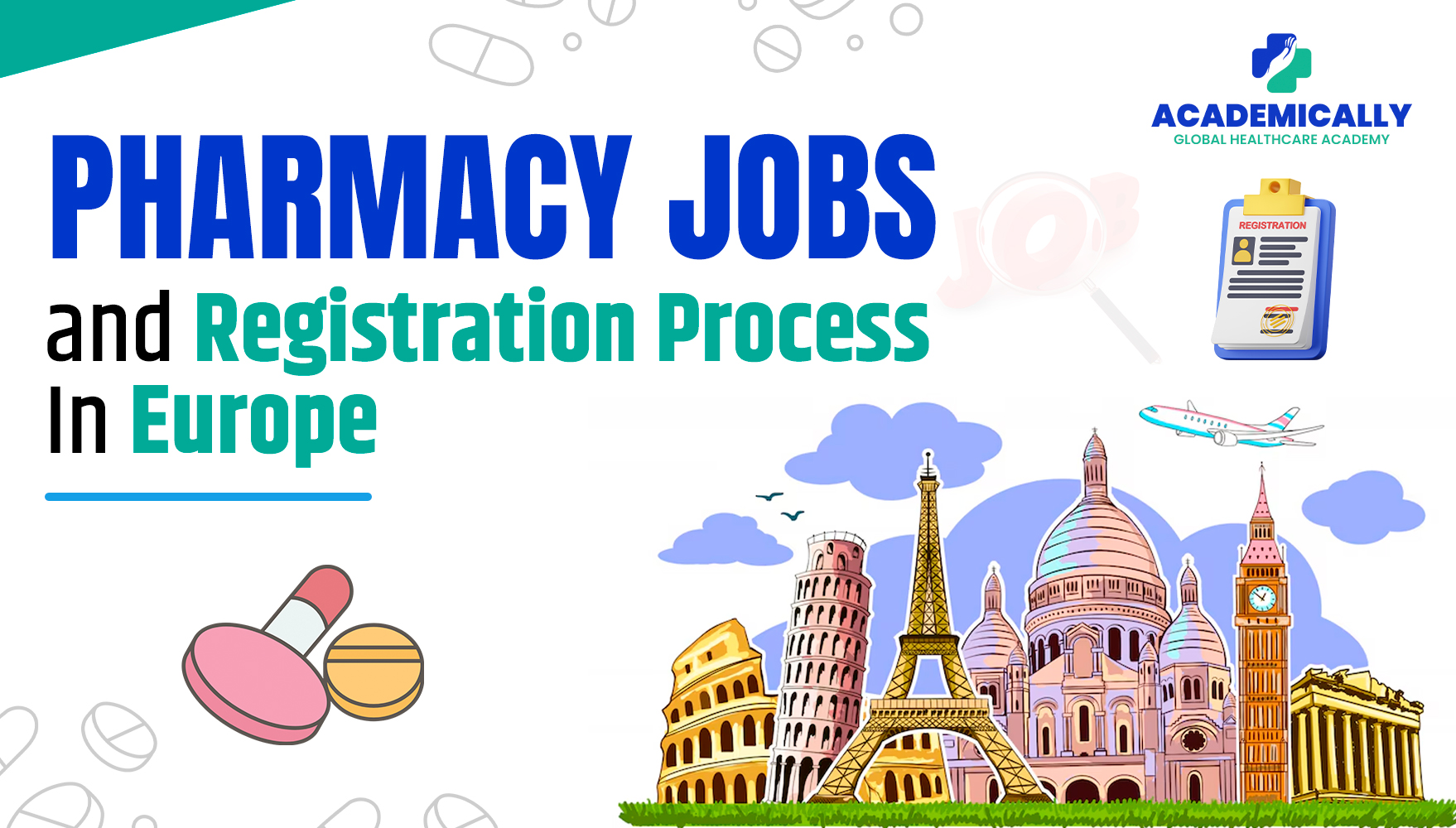Germany
Germany offers one of the most robust healthcare systems in Europe, creating numerous opportunities for pharmacists. The demand for pharmacists is consistently high in various sectors, from community pharmacies to hospitals and the pharmaceutical industry. Here’s what you need to know if you’re considering Germany for your pharmacy career:
Requirements to Work as a Pharmacist in Germany
- Pharmacy Degree: Your pharmacy degree must be recognised by German authorities. If obtained outside Germany, it will be assessed for equivalency to German standards.
- Language Proficiency: Proficiency in German (B2 or C1 level) is required to communicate with patients and understand prescriptions.
- Recognition of Qualifications: Non-EU pharmacists must have their credentials evaluated by the Approbationsbehörde (State Examination Office). If your qualifications meet the standards, you can proceed with the licensing process; otherwise, additional exams or training may be required.
Process of Becoming a Licensed Pharmacist in Germany
- Recognition of Foreign Qualifications:
If you completed your pharmacy degree abroad, you must have your qualifications evaluated by the State Examination Office. If they are not fully recognised, additional exams or a bridging program may be required. - Approbation (Licensing):
After your qualifications are recognised, apply for Approbation, the official license to practice in Germany. You'll need to submit documents like your degree, proof of language proficiency, and any additional certificates. - Language Proficiency:
Proficiency in German (typically B2 or C1 level) is required. If your language skills are insufficient, you may need to pass a language test. - Supplementary Exams or Training:
Non-EU pharmacists may need to take supplementary exams or complete additional training to meet German standards. This could involve clinical practice or knowledge assessments.
Ireland
Graduates with the following qualifications can apply for the PSI exam:
- Bachelor of Pharmacy (B.Pharm)
- Master of Pharmacy (M.Pharm)
- Doctor of Pharmacy (Pharm.D)
The Pharmaceutical Society of Ireland (PSI) has updated its registration process for overseas pharmacists, making it more streamlined and efficient. Here are the key steps:
- Submit Application
- Complete the TCQR (Temporary Certification for Qualification Recognition) application form, including the Certificate of Identity and Statutory Declaration.
- Pay the application fee and email all documents to noneuroute@psi.ie with “TCQR Application” in the subject line.
- Initial Review (Stage 1)
- PSI verifies the completeness and eligibility of your application.
- Holistic Assessment (Stage 2)
- Independent assessors evaluate your qualifications, experience, and training against Irish pharmacy standards.
- Outcome:
- Path A: If your qualifications meet Irish standards, you receive a Certificate of Qualification Appropriate for Practice, allowing you to proceed with registration.
- Path B: If deficiencies are found, you must complete an aptitude test (Stage 3B).
- Aptitude Test (Stage 3B)
- MCQ: Tests knowledge in pharmacology, pharmacy practice, basic sciences, and pharmaceutical calculations.
- OSCE: Assesses practical skills and competence in real-life pharmacy scenarios.
- Certificate and Registration
- After successful completion of all steps, PSI issues a Certificate of Qualification Appropriate for Practice.
- You can then register as a pharmacist in Ireland.
United Kingdom
Eligibility Criteria
- Qualification: Pharmacy degree equivalent to a UK BPharm or PharmD.
- Registration: Registered or eligible to register as a pharmacist in your home country.
- English Proficiency: Minimum IELTS score of 6.0 in all components or equivalent (PTE, OET, TOEFL).
- Experience: Preferably 6 months of patient-facing pharmacy experience (varies by program).
- Medical Fitness: Must meet health standards for the course and placements.
Steps to OSPAP
- Document Assessment: Register and submit required documents with a £739 non-refundable fee.
- English Proficiency Test: Clear IELTS, PTE, OET, or TOEFL to meet language requirements.
- Apply for OSPAP Programs: Attend interviews (held November–February) at participating universities.
- Foundation Training: Complete 52 weeks of internship in England, Scotland, or Wales.
- GPhC Registration Assessment: Pass the exam to register and start practising as a pharmacist in the UK.
Switzerland
Switzerland is known for its stunning landscapes and world-class healthcare system. It provides exceptional opportunities for pharmacists aiming to excel in the healthcare sector.
It has a robust healthcare framework and an excellent quality of life. Switzerland has emerged as a sought-after destination for pharmaceutical professionals from across the globe.
Eligibility to Become a Pharmacist in Switzerland
- Undergraduate Degree: Hold a pharmacy degree recognised as equivalent to Swiss standards.
- Registration: Be a licensed pharmacist in your home country.
Registered Process in Switzerland for Pharmacists
1. Language Proficiency
Prove fluency in the official language of the Swiss region where you intend to work (German, French, Italian, or Romansh) through tests or other certifications.
2. Practical Training
Complete mandatory internships or supervised training in a Swiss pharmacy or healthcare setting, as required by the region.
3. Swiss Federal Exam
4. Register
Submit your diploma recognition, exam results, and other documents to register with the Swiss Pharmaceutical Association or the regional regulatory body.
Also Read: Things to Know about Building a Career as a Pharmacist in Switzerland
Job Opportunities
Europe offers various job opportunities for pharmacists in different sectors, including:
- Community Pharmacy: This is the most common sector where pharmacists are employed. You’ll be working in pharmacies, providing prescriptions, advice on medications, and over-the-counter drug sales.
- Hospital Pharmacy: Hospital pharmacists are responsible for the safe and effective use of medications in hospitals. Opportunities in this sector can be more competitive and may require additional qualifications or experience.
- Research and Development (R&D): Europe has a strong pharmaceutical industry with opportunities in R&D for those interested in working for pharmaceutical companies. Countries like Germany, Switzerland, and the UK are hubs for pharmaceutical innovation.
- Regulatory Affairs: Pharmacists can also work in regulatory roles, helping pharmaceutical companies comply with local and international laws governing drug development and marketing.
In Summary
Pharmacist jobs in Europe are rewarding but require a clear understanding of country-specific requirements. From Germany’s high demand to Switzerland’s precision in standards, opportunities are abundant for those willing to meet the qualifications. Research your target country, prepare for language and licensing exams, and embark on a fulfilling career in Europe’s thriving healthcare sector.
Are you a passionate pharmacist looking for opportunities abroad? If you haven't made up your decision yet, book a free one-on-one counselling with our expert. You just need to fill out this form.





